| Reviews & Columns |
|
Reviews DVD TV on DVD Blu-ray 4K UHD International DVDs In Theaters Reviews by Studio Video Games Features Collector Series DVDs Easter Egg Database Interviews DVD Talk Radio Feature Articles Columns Anime Talk DVD Savant Horror DVDs The M.O.D. Squad Art House HD Talk Silent DVD
|
DVD Talk Forum |
|
|
| Resources |
|
DVD Price Search Customer Service #'s RCE Info Links |
|
Columns
|
|
|
Delicatessen -- StudioCanal Collection
Lionsgate Home Entertainment // R // September 14, 2010
List Price: $39.99 [Buy now and save at Amazon]
The Film:
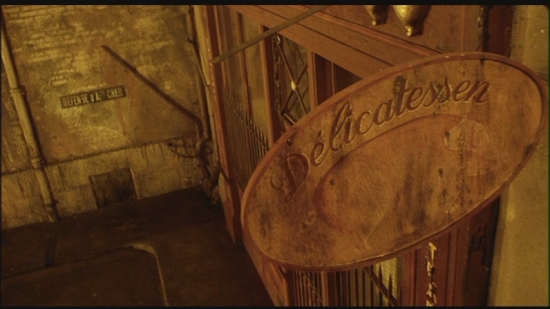
A yellow haze coating an empty corner of post-apocalyptic France clouds our vision in Jean-Pierre Jeunet and Marc Caro's Delicatessen, a marvel of the senses from two highly imaginative minds. As the camera pans towards a small butcher's shop, the directorial pair introduces us to the extent of humanity's flexibility in the wake of, well, some disaster. No, we have no clue what's actually happened, nor how long everything's been this way. The delicatessen is just ... there, with a cluster of fidgety people filing to the counter for the meat the butcher (Jean-Claude Dreyfus) has to offer, with satchels of corn in-hand as payment instead of currency. Only, when they talk about shoulders, they're not talking about from a slab of beef or pork. Therein lays both the dark twist and the sick comedic angle behind this creative work of art, which somehow excels at being delightful, sickening, and visually stunning all at the same time.
The gloom only heightens once amiable ex-clown Louisan (Dominique Pinon) enters the picture, who arrives at the butcher's shop in hopes of taking an open handyman position he spotted in the paper, colloquially titled "Hard Times". In fact, the ad is actually a lure, a way to get semi-burly men (or women, I suppose) to the building so that the deli's shelves can be restocked with "fresh produce" for the tenants in the upstairs apartments. After the butcher gives him a reluctant once-over, Louisan gets the job, which involves doing muscle-building odds-'n-ends for both the deli and the hostel-like apartments that reside above. It's here that we meet the odd folks holed up in this eerie corner of abandoned society, which includes a pair of toy makers cranking out those "moooo" rotating sound makers, a suicidal woman who doesn't have the gall to advertently kill herself, and a sweet, vision-impaired cellist daughter to the butcher, Julie (Marie-Laure Dougnac) -- who takes a romantic interest in Louisan.
With parallels to early David Lynch and Terry Gilliam, and even a healthy splash of Tarkovsky's Stalker, Delicatessen bundles the components of its post-apocalyptic setting into a bizarre flourish of artistic whimsy. Shot by gifted cinematographer Darius Khonji (Se7en), it creates a sense of isolation outside the deli through those dusty shots of dilapidated buildings coated with a dense yellow fog. On the inside, however, the pallid shades become warming, even oddly inviting as the camera moves across found objects in the characters' apartments -- the posters and ruby-red monkey costume in Louisan's room, Julie's tea set and treats, and the oddly-symbiotic environment in an old man's wading pool of a basement apartment where he raises, and consumes, snails and frogs. Jeunet and Caro tinker with these bits within the brash-yet-alluring palette, but rarely without some figurative point behind them.
As the ex-clown goes about his errands with a bounce in his step, painting the ceiling in one apartment and fixing the squeaks in the bed's box springs in another, Delicatessen focuses on the apartment dwellers' eccentricities in a dark, voyeuristic fashion that's rich with detailed creepiness. It becomes an idiosyncratic farce of the way these people cope with what's essentially the "end of the world", along with how they stomach their alternate form of nourishment and maintain something resembling a status quo. Yet the rendering of these highly-animated characters, some shrewd and others affable, isn't repellent; instead, their obscurity draws us in, even becoming playful amid botched suicide attempts and noise boxes that mimic sounds of animals that no longer exist. That's not even taking the vegetarian Troglodins -- tunnel-crawling, wetsuit-wearing food hoarders -- into account, whose antics will eventually permeate the film's third act.
Bleak, near-laughless wit stirs in the building because of this peculiarity, but that's exactly what Jeunet and Caro want us to feel. And it works. As the oddness persists and Louisan's time on the chopping block inches closer, Delicatessen excels as a melting pot of moods -- a soupy swirl of repulsive, warm-hearted, romantic, and unsettling tempers -- that bursts with originality. More often than not, the directorial duo experiment with the tones it generates into compellingly juxtaposed scenes, such as the "date" Louisan and Julie share that blends our awareness of the building's cannibalism with the charming fumbles of their romantic link. The most blatant exercise of their playfulness would be an absurd rhythmic sound sync between all the tenants, where rug-pounding, toy-screwing, and roof-painting follow with the squeaks under the butcher's bed mid-amore with almost a Pied Piper-like obedience.
Where the front of end of Delicatessen relishes in the deviant quirks of its tonality, the final act scrambles to find a zenith in the many threads of oddity it spins. As it does, while guiding us through the Troglodin tunnels and heightening the tension in the apartment building, the otherwise deftly fluid structure of this black comedy begins to showcase a lack of clear vision at the end of the tunnel. It explodes into a chaotic turn of events which borderlines on the absurd, yet the means reach an invigorating conclusion -- with a beautifully cathartic final sequence -- that justifies the zany, amusing twaddle Jeunet and Caro concoct. These are forgivable caveats for this moody play on macabre decencies, one that's as sly with its humor as it is with its out-of-the-box construction, and it's a stunning achievement well worth seeing many times over for its rich aesthetic and quirky heart.
The Blu-ray:
Lionsgate brings this StudioCanal Collection presentation of Delicatessen to Blu-ray in a standard case with a matte cardboard slipcase replicating the front and back covers, just like their packages for Contempt and Ran, along with a beefy Booklet containing photographs and an essay from Kim Newman.
Video and Audio:
Remember when Delicatessen was difficult to find on North American shores, where the only options to see Jean-Pierre Jeunet and Marc Caro's film were either a barely-satisfactory UK DVD or other not-so-savory methods? That's changed over the past couple of years, first with Miramax releasing a highly competent disc in 2007 and, subsequently, Lionsgate essentially repurposing the same material for their own pressing. To think that a high-definition disc of this film would be available roughly three years afterwards boggles the mind, which is exactly what the StudioCanal Collection -- by way of Lionsgate -- has done. The leap in quality will astound just about anyone who's seen this visual piece of artwork, jumping in just a few short years from obscurity to one of the more stunning renderings of an abstract film to hit the home video format.
This presentation of Darius Khonji's cinematography has become a personal favorite disc, and easily one of my favorites of 2010. Preserving the film's original 1.85:1 aspect ratio within a 1080p AVC encode, sporting a bitrate that reaches 30mbps at times, this Studio Canal Blu-ray pays careful attention to the elements that highlight Delicatessen's signature look. Heavy grain floods many sequences in the film, mostly the hazy exterior shots, while Jean-Pierre Jeunet's signature yellow-and-green color timing dominates its overall appearance. With those factors clearly in mind, it's remarkable how shapely the contours and how crisp the lines in the film can be. The palette exhibits a level of controlled that's unexpectedly perfect, while the varied textures showcase far more tangibility than could've been imagined for this film. Wallpaper patters and roughness leap out, the weave pattern in Louisan's sweater looks textile enough to touch, while the granule texture against the aged televisions, skin grain, and trickling water all appear unbelievably natural. If there's anything to critique, it's the heavier grain that forms in the darker exterior shots of dilapidated buildings and the occasional film speckle. Aside from that, it's a real stunner.
The audio presentation for Delicatessen has always been a 2-channel Stereo mix, and this Blu-ray doesn't steer from that consistency with its DTS HD Master Audio track. However, in comparison to the Dolby Digital offering on the Miramax/Lionsgate standard-definition discs, the clarity and robustness of the astonishing sound design certainly doesn't disappoint. There are a ton of varied sound effects throughout the film -- the rumbling of voices in a woman's head, drips of water, the gorgeous strums of a cello playing alongside the whiny notes coming from Theremin-inspired saw -- which all sound exceptionally clear and well-balanced, exerting a fine level of separation between the front channels. While a rug beater slams repeatedly into a dusty rug draped over stretch of railing, the high-pitched squeals of a springing bed pierce the upper shelf of the sound design with great expression of range. Verbal clarity remains top-shelf, the ominous rumble outside sounds exquisite, and the echoic Troglodin tunnels offer a ravishing level of ambience. In short, Delicatessen sounds stellar.
Special Features:
Commentary with Jean-Pierre Jeunet (From SD):
Though an old commentary track, Jeunet's content here deserves to be replicated. He stays on-point and insightful for the entire run, hopping between anecdotal musings and technical points with a consistent rhythm. He talks about the models he used and how he photographed them on the same set La Femme Nikita had been shot on, where Jeunet and Caro faulted in not communicating where the old man with frogs and snails lived in the building (hint: not the basement), and the meticulous rehearsal behind the highly erratic tea scene. It's such a great track, one that thankfully didn't need replacement between editions of the film -- and can now be viewed alongside the striking HD image. Note that the commentary is in French with subtitles.
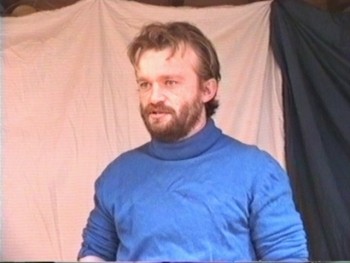 "Main Course Pieces" Retrospective Documentary (1:05:28, HD AVC):
"Main Course Pieces" Retrospective Documentary (1:05:28, HD AVC):
Though this feature is the only brand-new addition to the package, it's a real beauty. This piece take a very sober look at the construction of Delicatessen, both the warts and the positive aspects behind it all. It follows the process of conception, from the germ of an idea to the influences and resources crammed into its length, all the way to the process of getting a film off the ground that'd have no major stars and would feature comedy within a story about cannibalism. Dominique Pinon discusses his shift from villainous roles into the place of a "Prince Charming" clown, Jean-Claude Dreyfus reveals how he was selected as the butcher (as well as showing off his bizarre fascination with pigs), while discussion also zeroes in on the myriad of props utilizes in the film -- and which one recurs in several other pictures after its usage in '91. Though it's one large feature, it could've been segmented in a handful of pieces to "fill out" the menu; rest assured, it's an essential, wonderful supplement to everything else included.
Also carried over from the standard-definition DVD are the Fine-Cooked Meats: Making of Delicatessen (13:30, SD MPEG-2) feature that somewhat generically fumbles through behind-the-scenes shots, Jean-Pierre Jeunet's Archives (8:43, SD MPEG-2) that offers screen tests with the actors spliced into footage from the film, as well as two trailers -- a collage of Teaser (1:34, SD MPEG-2) material, and a full Trailer (2:08, SD MPEG-2).
Final Thoughts:
Before The City of Lost Children and Amelie thrust their names into the mainstream of contemporary French cinema, Jean-Pierre Jeunet and Marc Caro ventured into the realm of pitch-black humor with Delicatessen, a post-apocalyptic story that thrives in its mix of sinister tonality, visual flare, and a warming core. Though it nimbly mixes its macabre content with an understated sense of humor, the artistry present in its construction -- along with Darius Khonji's acute, succulent photography -- bolster it forward as a true achievement that's not to be missed. Lionsgate's presentation of the StudioCanal Blu-ray finds similar praise, presenting the abstract film with staggering upgrades in both visual and aural arenas, while also adding an essential hour-long documentary to the comprehensive slate of compiled special features from previous offerings. Based on its audiovisual excellence, the inclusion of supplements both old and new, and the supreme return value of the film itself, Delicatessen earns the label of being an addition to DVDTalk's Collector Series.
Note: Images in this review are from Miramax's DVD from 2007, and do not represent the quality of the Blu-ray disc reviewed here.
Thomas Spurlin, Staff Reviewer -- DVDTalk Reviews | Personal Blog/Site

A yellow haze coating an empty corner of post-apocalyptic France clouds our vision in Jean-Pierre Jeunet and Marc Caro's Delicatessen, a marvel of the senses from two highly imaginative minds. As the camera pans towards a small butcher's shop, the directorial pair introduces us to the extent of humanity's flexibility in the wake of, well, some disaster. No, we have no clue what's actually happened, nor how long everything's been this way. The delicatessen is just ... there, with a cluster of fidgety people filing to the counter for the meat the butcher (Jean-Claude Dreyfus) has to offer, with satchels of corn in-hand as payment instead of currency. Only, when they talk about shoulders, they're not talking about from a slab of beef or pork. Therein lays both the dark twist and the sick comedic angle behind this creative work of art, which somehow excels at being delightful, sickening, and visually stunning all at the same time.
The gloom only heightens once amiable ex-clown Louisan (Dominique Pinon) enters the picture, who arrives at the butcher's shop in hopes of taking an open handyman position he spotted in the paper, colloquially titled "Hard Times". In fact, the ad is actually a lure, a way to get semi-burly men (or women, I suppose) to the building so that the deli's shelves can be restocked with "fresh produce" for the tenants in the upstairs apartments. After the butcher gives him a reluctant once-over, Louisan gets the job, which involves doing muscle-building odds-'n-ends for both the deli and the hostel-like apartments that reside above. It's here that we meet the odd folks holed up in this eerie corner of abandoned society, which includes a pair of toy makers cranking out those "moooo" rotating sound makers, a suicidal woman who doesn't have the gall to advertently kill herself, and a sweet, vision-impaired cellist daughter to the butcher, Julie (Marie-Laure Dougnac) -- who takes a romantic interest in Louisan.
With parallels to early David Lynch and Terry Gilliam, and even a healthy splash of Tarkovsky's Stalker, Delicatessen bundles the components of its post-apocalyptic setting into a bizarre flourish of artistic whimsy. Shot by gifted cinematographer Darius Khonji (Se7en), it creates a sense of isolation outside the deli through those dusty shots of dilapidated buildings coated with a dense yellow fog. On the inside, however, the pallid shades become warming, even oddly inviting as the camera moves across found objects in the characters' apartments -- the posters and ruby-red monkey costume in Louisan's room, Julie's tea set and treats, and the oddly-symbiotic environment in an old man's wading pool of a basement apartment where he raises, and consumes, snails and frogs. Jeunet and Caro tinker with these bits within the brash-yet-alluring palette, but rarely without some figurative point behind them.
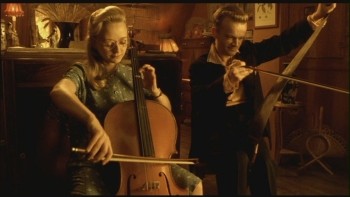 | 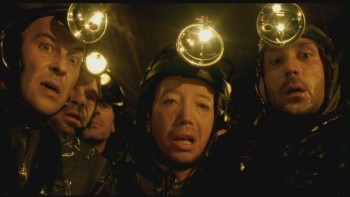 |
As the ex-clown goes about his errands with a bounce in his step, painting the ceiling in one apartment and fixing the squeaks in the bed's box springs in another, Delicatessen focuses on the apartment dwellers' eccentricities in a dark, voyeuristic fashion that's rich with detailed creepiness. It becomes an idiosyncratic farce of the way these people cope with what's essentially the "end of the world", along with how they stomach their alternate form of nourishment and maintain something resembling a status quo. Yet the rendering of these highly-animated characters, some shrewd and others affable, isn't repellent; instead, their obscurity draws us in, even becoming playful amid botched suicide attempts and noise boxes that mimic sounds of animals that no longer exist. That's not even taking the vegetarian Troglodins -- tunnel-crawling, wetsuit-wearing food hoarders -- into account, whose antics will eventually permeate the film's third act.
Bleak, near-laughless wit stirs in the building because of this peculiarity, but that's exactly what Jeunet and Caro want us to feel. And it works. As the oddness persists and Louisan's time on the chopping block inches closer, Delicatessen excels as a melting pot of moods -- a soupy swirl of repulsive, warm-hearted, romantic, and unsettling tempers -- that bursts with originality. More often than not, the directorial duo experiment with the tones it generates into compellingly juxtaposed scenes, such as the "date" Louisan and Julie share that blends our awareness of the building's cannibalism with the charming fumbles of their romantic link. The most blatant exercise of their playfulness would be an absurd rhythmic sound sync between all the tenants, where rug-pounding, toy-screwing, and roof-painting follow with the squeaks under the butcher's bed mid-amore with almost a Pied Piper-like obedience.
Where the front of end of Delicatessen relishes in the deviant quirks of its tonality, the final act scrambles to find a zenith in the many threads of oddity it spins. As it does, while guiding us through the Troglodin tunnels and heightening the tension in the apartment building, the otherwise deftly fluid structure of this black comedy begins to showcase a lack of clear vision at the end of the tunnel. It explodes into a chaotic turn of events which borderlines on the absurd, yet the means reach an invigorating conclusion -- with a beautifully cathartic final sequence -- that justifies the zany, amusing twaddle Jeunet and Caro concoct. These are forgivable caveats for this moody play on macabre decencies, one that's as sly with its humor as it is with its out-of-the-box construction, and it's a stunning achievement well worth seeing many times over for its rich aesthetic and quirky heart.
The Blu-ray:
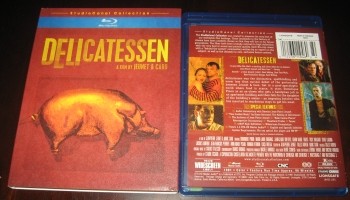 | 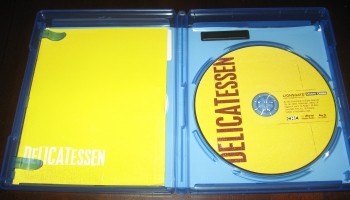 |
Lionsgate brings this StudioCanal Collection presentation of Delicatessen to Blu-ray in a standard case with a matte cardboard slipcase replicating the front and back covers, just like their packages for Contempt and Ran, along with a beefy Booklet containing photographs and an essay from Kim Newman.
Video and Audio:
Remember when Delicatessen was difficult to find on North American shores, where the only options to see Jean-Pierre Jeunet and Marc Caro's film were either a barely-satisfactory UK DVD or other not-so-savory methods? That's changed over the past couple of years, first with Miramax releasing a highly competent disc in 2007 and, subsequently, Lionsgate essentially repurposing the same material for their own pressing. To think that a high-definition disc of this film would be available roughly three years afterwards boggles the mind, which is exactly what the StudioCanal Collection -- by way of Lionsgate -- has done. The leap in quality will astound just about anyone who's seen this visual piece of artwork, jumping in just a few short years from obscurity to one of the more stunning renderings of an abstract film to hit the home video format.
This presentation of Darius Khonji's cinematography has become a personal favorite disc, and easily one of my favorites of 2010. Preserving the film's original 1.85:1 aspect ratio within a 1080p AVC encode, sporting a bitrate that reaches 30mbps at times, this Studio Canal Blu-ray pays careful attention to the elements that highlight Delicatessen's signature look. Heavy grain floods many sequences in the film, mostly the hazy exterior shots, while Jean-Pierre Jeunet's signature yellow-and-green color timing dominates its overall appearance. With those factors clearly in mind, it's remarkable how shapely the contours and how crisp the lines in the film can be. The palette exhibits a level of controlled that's unexpectedly perfect, while the varied textures showcase far more tangibility than could've been imagined for this film. Wallpaper patters and roughness leap out, the weave pattern in Louisan's sweater looks textile enough to touch, while the granule texture against the aged televisions, skin grain, and trickling water all appear unbelievably natural. If there's anything to critique, it's the heavier grain that forms in the darker exterior shots of dilapidated buildings and the occasional film speckle. Aside from that, it's a real stunner.
The audio presentation for Delicatessen has always been a 2-channel Stereo mix, and this Blu-ray doesn't steer from that consistency with its DTS HD Master Audio track. However, in comparison to the Dolby Digital offering on the Miramax/Lionsgate standard-definition discs, the clarity and robustness of the astonishing sound design certainly doesn't disappoint. There are a ton of varied sound effects throughout the film -- the rumbling of voices in a woman's head, drips of water, the gorgeous strums of a cello playing alongside the whiny notes coming from Theremin-inspired saw -- which all sound exceptionally clear and well-balanced, exerting a fine level of separation between the front channels. While a rug beater slams repeatedly into a dusty rug draped over stretch of railing, the high-pitched squeals of a springing bed pierce the upper shelf of the sound design with great expression of range. Verbal clarity remains top-shelf, the ominous rumble outside sounds exquisite, and the echoic Troglodin tunnels offer a ravishing level of ambience. In short, Delicatessen sounds stellar.
Special Features:
Commentary with Jean-Pierre Jeunet (From SD):
Though an old commentary track, Jeunet's content here deserves to be replicated. He stays on-point and insightful for the entire run, hopping between anecdotal musings and technical points with a consistent rhythm. He talks about the models he used and how he photographed them on the same set La Femme Nikita had been shot on, where Jeunet and Caro faulted in not communicating where the old man with frogs and snails lived in the building (hint: not the basement), and the meticulous rehearsal behind the highly erratic tea scene. It's such a great track, one that thankfully didn't need replacement between editions of the film -- and can now be viewed alongside the striking HD image. Note that the commentary is in French with subtitles.
 "Main Course Pieces" Retrospective Documentary (1:05:28, HD AVC):
"Main Course Pieces" Retrospective Documentary (1:05:28, HD AVC): Though this feature is the only brand-new addition to the package, it's a real beauty. This piece take a very sober look at the construction of Delicatessen, both the warts and the positive aspects behind it all. It follows the process of conception, from the germ of an idea to the influences and resources crammed into its length, all the way to the process of getting a film off the ground that'd have no major stars and would feature comedy within a story about cannibalism. Dominique Pinon discusses his shift from villainous roles into the place of a "Prince Charming" clown, Jean-Claude Dreyfus reveals how he was selected as the butcher (as well as showing off his bizarre fascination with pigs), while discussion also zeroes in on the myriad of props utilizes in the film -- and which one recurs in several other pictures after its usage in '91. Though it's one large feature, it could've been segmented in a handful of pieces to "fill out" the menu; rest assured, it's an essential, wonderful supplement to everything else included.
Also carried over from the standard-definition DVD are the Fine-Cooked Meats: Making of Delicatessen (13:30, SD MPEG-2) feature that somewhat generically fumbles through behind-the-scenes shots, Jean-Pierre Jeunet's Archives (8:43, SD MPEG-2) that offers screen tests with the actors spliced into footage from the film, as well as two trailers -- a collage of Teaser (1:34, SD MPEG-2) material, and a full Trailer (2:08, SD MPEG-2).
Final Thoughts:
Before The City of Lost Children and Amelie thrust their names into the mainstream of contemporary French cinema, Jean-Pierre Jeunet and Marc Caro ventured into the realm of pitch-black humor with Delicatessen, a post-apocalyptic story that thrives in its mix of sinister tonality, visual flare, and a warming core. Though it nimbly mixes its macabre content with an understated sense of humor, the artistry present in its construction -- along with Darius Khonji's acute, succulent photography -- bolster it forward as a true achievement that's not to be missed. Lionsgate's presentation of the StudioCanal Blu-ray finds similar praise, presenting the abstract film with staggering upgrades in both visual and aural arenas, while also adding an essential hour-long documentary to the comprehensive slate of compiled special features from previous offerings. Based on its audiovisual excellence, the inclusion of supplements both old and new, and the supreme return value of the film itself, Delicatessen earns the label of being an addition to DVDTalk's Collector Series.
Note: Images in this review are from Miramax's DVD from 2007, and do not represent the quality of the Blu-ray disc reviewed here.
|
| Popular Reviews |
| Sponsored Links |
|
|
| Sponsored Links |
|
|
| Release List | Reviews | Shop | Newsletter | Forum | DVD Giveaways | Blu-Ray | Advertise |
|
Copyright 2024 DVDTalk.com All Rights Reserved. Legal Info, Privacy Policy, Terms of Use,
Manage Preferences,
Your Privacy Choices | |||||||












